Psychiatrists today can benefit by learning more about the work of the late Chester Middlebrook Pierce, M.D. (1927-2016) and helping to advance it, according to Cynthia Turner-Graham, M.D., president of the Black Psychiatrists of America and president and CEO of ForSoundMind Enterprises. She chaired a panel discussion at the APA Annual Meeting titled “Race and Excellence: The Continuation.”
Panelists called him a visionary, a pioneering clinician, and a trailblazing human rights advocate who broke many racial barriers in his lifetime. Some of Pierce’s contributions include his research on how to optimize early childhood social and emotional development as well as on the psychological impact of living in extreme environments, Turner-Graham said
Pierce grew up in Glen Clove, N.Y., where only about 80 Black people lived at the time. Despite being one of the few Black students at his high school, he became the first Black class president and went on to be accepted at Harvard University. After earning his M.D. from Harvard in 1952, he served as a professor of education and psychiatry there. He published more than 180 professional books and articles and served on 22 editorial boards. He held numerous leadership positions including president of the American Board of Psychiatry and Neurology in 1978 and president of the American Orthopsychiatric Association in 1983. He worked tirelessly to promote human rights, conservation, and youth education throughout his life.
Pierce maintained that racism was an “environmental pollutant,” explained Ezra E. H. Griffith, M.D., author of the book
Race and Excellence: My Dialogue With Chester Pierce (which will be available in its second edition from APA Publishing in September) and professor emeritus of psychiatry and African American studies at Yale. Pierce coined the term “micro-aggression,” a term widely used today to refer to subtle or indirect actions against any marginalized group.
Pierce struggled to overcome racism himself on a near-daily basis and believed that a Black man can “never truly belong to any predominantly White organization in this country,” Griffith said. In fact, he was known to accept few social invitations from White colleagues at Harvard and even avoid faculty meetings to protect himself from “constant microtrauma.” Restricting his social interactions with White people freed him to think about “what Blacks should do and how they should behave in a world so thoroughly influenced by racist thinking.”
Despite these challenges, Pierce embraced and embodied the virtues of gentleness, kindness, and cheerfulness and displayed “remarkable civility in his interpersonal relations, coupled with an unwillingness to show anger publicly,” Griffith added.
Turner-Graham said that Pierce was a strong advocate of Black psychiatrists. He was the founding president of the Black Psychiatrists of America in 1969 and served as a mentor to many. He was also a proponent of working with and through organizations that are not majority Black, she added. With that in mind, Pierce took an active position starting early in his career to work against racism within APA.
Griffith told attendees it is little known that Pierce served as a senior consultant for the children’s public television program, “Sesame Street,” which began airing in 1969, an era of racial segregation and just one year after the assassination of Dr. Martin Luther King Jr. Pierce is credited with helping to bolster the self-worth of generations of Black children by encouraging the show to depict a racially diverse, integrated, community centered on cooperation. The pioneering show featured a Black school teacher and his wife, Susan, a nurse who ran her own immunization clinic. Other minority characters were also included on the cast. Pierce eventually resigned from his consulting role after his idea to depict a Black person as a physician was rejected, Griffith said.
In 2002, five years after retiring as a psychiatrist, Pierce organized an “African Diaspora” conference that brought together psychiatrists from around the globe and co-founded the Massachusetts General Hospital’s Division of International Psychiatry, later renamed the Chester M. Pierce, M.D., Division of Global Psychiatry. The organization conducts global mental health research and focuses on increasing access to treatment in underserved countries.
Blacks Underrepresented on Faculties
When it comes to overcoming societal racism, some progress has been made, but much work remains to done, panelists said. A 2018 survey by the American Association of Medical Colleges (AAMC) found that just 5% of practicing physicians were Black, explained presenter Rahn Kennedy Bailey, M.D., chair and head of the Department of Psychiatry and assistant dean for community engagement at Louisiana State University Health Sciences Center in New Orleans.
“This is less than half of what it should be,” he said. In fact, U.S. Census estimates show that Black people made up 14.6% of the U.S. population that year. Practicing physicians from racial and ethnic minority backgrounds often confront racism and bias not only from peers and supervisors, he said, but also from the patients they serve.
When it comes to the full-time faculty who are instructing future physicians, there is even less minority representation—just 3.6% are Black, and of those, just 6.5% were faculty in psychiatry.
Bailey said another problem minority medical faculty face is the “minority tax.” In other words, their phone rings constantly with requests to serve on every committee and panel, he said. As a result, minority faculty members have an outsized number of extra responsibilities. This leaves them less time for activities such as writing and conducting their own research, he said. Furthermore, he said, the relative scarcity of minority physicians itself leads to an additional workload on minority faculty, which can lead to burnout.
A 2019 report on diversity and inclusion by the AAMC found that there have been “no notable increases in medical school applicants and matriculants among Blacks, American Indian, or Alaska Native people,” Bailey said. “Some of this disparity can be attributed to widespread implicit and explicit biases that create exclusionary environments.”
“To make a real difference, diversity initiatives should have measured outcomes, and not just be fodder for discussion,” Bailey said. Not only does research show that minority patients feel more comfortable or prefer to be treated by race-concordant physicians, but they also reap better outcomes. One study found that Black patients who met with Black physicians were far more likely to receive recommended preventive services than those treated by others. Another found that Black men are three times more likely to be forthcoming about their substance use history when being treated by Black physicians.
“Better diversity can lead to better outcomes and fewer treatment biases and disparities,” Bailey pointed out. ■

